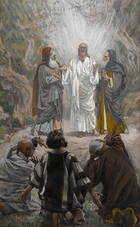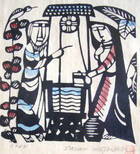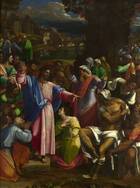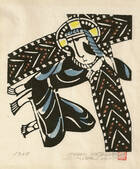Sunday Evangelium in the Season of Lent
Here are the homilies given by Father Andrew Pinsent & Father Marcus Holden during the season of Lent. Liturgical 'Year A' began on 1st Sunday of Advent, 1 December 2013.
You can subscribe to this Totus2us podcast here on the RSS feed or here on iTunes. Plus you can download the free mp3 audio recordings individually by right / double clicking on the blue play buttons.
1st Sunday of Lent
by Father Andrew Pinsent, in Year A ![]()
"Adam and Eve do not need to taste the fruit to be like God or to know good and evil, for they are already made in the image and likeness of God and know what they should and shouldn't do. Similarly in today's Gospel, Jesus does not need to accept the kingdoms of the world from the devil's hand, because he already has them in his own hand. All that the devil tempts with is not a false means to a true end (the temptation of pragmatism - but the false means to a false end, an ending that is in death and not in life. So may God help us to recognise and resist false promises of happiness, to keep integrity and friendship with Him, and come safely one day into the true and lasting happiness of heaven."
Readings: Gospel - Matthew 4: 1-11 - At that time Jesus was led by the Spirit into the desert to be tempted by the devil. He fasted for forty days and forty nights, and afterwards he was hungry. The tempter approached and said to him, “If you are the Son of God, command that these stones become loaves of bread.” He said in reply, “It is written: One does not live on bread alone, but on every word that comes forth from the mouth of God.”
by Father Andrew Pinsent, in Year B ![]()
Penance
"The reason why treating our relationship to God as a contract is so abhorrent is that what God wants is for us to enjoy a relationship with him that is second-personal, not third-personal, of an 'I' to 'Thou', not an individual to a remote benefactor. In other words, God wants us to love with him what he loves, and sacrifice with him what he sacrifices, as happens at every Mass. In today's First Reading, this relationship is spoken of as a covenant not a contract, a union of soul as in the Christian Sacrament of marriage and not just an exchange of goods, and this is also the context in which, I think, we should understand how we are meant to use this opportunity of Lent. Our goals in Lent should not be to increase our credit balance with God, which is abhorrent and impossible anyway, but to repent of what you might call our adulterous spiritual liaisons, those times in which we give our souls, in effect, over to what is not of God, especially the false gods of pride, envy, anger, sloth, avarice, gluttony and lust."
Readings: Gospel: Mark: 1, 12-15: The Spirit drove Jesus out into the desert, and he remained in the desert for forty days, tempted by Satan. He was among wild beasts, and the angels ministered to him. After John had been arrested, Jesus came to Galilee proclaiming the gospel of God: this is the time of fulfillment. The kingdom of God is at hand. Repent, and believe in the gospel.
2nd Sunday of Lent
by Father Andrew Pinsent, in Year A ![]()
The Transfiguration
"The Transfiguration of Jesus might seem so extraordinary and yet remote that it is hard to see what relevance it has to our lives. As a miracle, it served to strengthen the faith of the apostles Peter, James and John, at least when they had recovered from their fear. Yet extraordinary visions and a voice from heaven 2000 years ago might seem a long way from the concerns of our lives today. Nevertheless the transfiguration is of the greatest relevance for us, to our very hope of happiness. For if we interpret these events carefully we can glimpse the glory that God wills us to have by faith in His Beloved Son. As a consequence we should be encouraged as we make our way on pilgrimage through the darkness of this world to the kingdom of heaven."
Today's Readings: Gospel - Matthew 17: 1-9 - “Jesus took Peter, James, and John his brother, and led them up a high mountain by themselves. And he was transfigured before them; his face shone like the sun and his clothes became white as light. And behold, Moses and Elijah appeared to them, conversing with him."
3rd Sunday of Lent
by Father Marcus Holden, in Year A ![]()
"If we only knew what God was offering, we would ask Him for a drink; if we only knew the gift of God. He would give us living water that would satisfy all our desire, all our thirst. The living water is grace; living water, not stagnant water, moving, continuing. it's linked to its source. God, who is unending. In the Old Testament we read about this fountain of living water, it's God Himself, Jeremiah tells us that. In psalms too we often hear about running streams; think of that psalm 'As the deer yearns for running streams, so my soul is thirsting for you, my God.' If we could only get this point, it's a key spiritual doctrine that runs like a golden thread all the way through the Scriptures."
by Father Andrew Pinsent, in Year A ![]()
"I want to focus on just one small detail of Jesus's conversation with the Samaritan woman: his use of the phrase 'living water'. Materially speaking, living water means fresh and flowing water; and for water to remain living and life-giving, it must be connected with its source. If water is cut off from its source it stops flowing, stagnates and becomes dead. Now if living water is understood to mean the spiritual life of the soul, as Jesus suggests, then the lessons of this biblical symbol become clear: just as flowing water must be connected to its source, we must be connected to God through the sacraments and prayer. Just as water is life-giving in many ways, if we remain in communion with God, our lives will also be fruitful in many ways."
Readings: Gospel - John 4: 5-42 - “A woman of Samaria came to draw water. Jesus said to her, “Give me a drink.” His disciples had gone into the town to buy food. The Samaritan woman said to him, “How can you, a Jew, ask me, a Samaritan woman, for a drink?” For Jews use nothing in common with Samaritans. Jesus answered and said to her, “If you knew the gift of God and who is saying to you, ‘Give me a drink' you would have asked him and he would have given you living water.”The woman said to him, “Sir, you do not even have a bucket and the cistern is deep; where then can you get this living water? Are you greater than our father Jacob, who gave us this cistern and drank from it himself with his children and his flocks?” Jesus answered and said to her, “Everyone who drinks this water will be thirsty again; but whoever drinks the water I shall give will never thirst; the water I shall give will become in him a spring of water welling up to eternal life.” The woman said to him, “Sir, give me this water, so that I may not be thirsty or have to keep coming here to draw water."
4th Sunday of Lent
by Father Marcus Holden, in Year A ![]()
"Who sinned? This man or his parents that he was born blind? The Gospel throws up before us today the greatest challenge to religion and to belief in God, or at least a loving God - that is the problem of evil, the origin of suffering and pain in this world. At least psychologically, it is the hardest difficulty for people to overcome in their minds before approaching God as a God of love. The problem can be posed in different ways but it is always the same, fundamentally: If God is all good and loving and at the same time all powerful and influential, how can He allow evil and suffering and pain in this world that He has created? Does He not care? That is the question of all who suffer, it's the question of all us because we do all suffer."
5th Sunday of Lent
by Father Marcus Holden, in Year A ![]()
"The friendships of God are truly personal friendships. Jesus weeps at the death of his friend Lazarus. Peter, James, John, Thomas, Martha, Mary and many others in the New Testament are his particular friends. Jesus is brought up in a particular family, by Mary and Joseph. Jesus does not love an abstract idea of humanity or an abstract idea of friendship, but loves this person and that person, you and me. You might say that the whole purpose of our existence here on earth is to become personal friends with God, to know and love God, to become part of the intimate family of God. May everything we do in our lives help to lead us to that goal."
Gospel Reading - John 11: 1-45:.. When Martha heard that Jesus was coming, she went to meet him; but Mary sat at home. Martha said to Jesus, “Lord, if you had been here, my brother would not have died. But even now I know that whatever you ask of God, God will give you.” Jesus said to her, “Your brother will rise.” Martha said to him, “I know he will rise, in the resurrection on the last day.” Jesus told her, “I am the resurrection and the life; whoever believes in me, even if he dies, will live, and everyone who lives and believes in me will never die. Do you believe this?” She said to him, “Yes, Lord. I have come to believe that you are the Christ, the Son of God, the one who is coming into the world.” ..
by Father Andrew Pinsent, in Year B ![]()
"There’s no cheap grace in this world, there’s no easy Christianity, no pain – no gain, no cross – no crown, no mortification – no sanctification, no sacrifice – no resurrection. There is indeed joy and it is a deeper joy than anything else in this world can give, there is glory greatly than all the kingdoms of the world, there is love more profound than any human relationship, there is life and without end – but it all comes through the cross, through trustful and obedient acceptance. The Greeks could get what they really wanted, that real beauty and lasting goodness, but it required the acceptance of the cross. That is the challenge for every Christian, that is our challenge of the next 12 days as we prepare for Good Friday itself."
Readings: Gospel: John 12: 20-33: ... Jesus replied to them: 'Now the hour has come for the Son of Man to be glorified. I tell you, most solemnly, unless a wheat grain falls on the ground and dies, it remains only a single grain; but if it dies, it yields a rich harvest. Anyone who loves his life loses it; anyone who hates his life in this world will keep it for the eternal life. If a man serves me, he must follow me, wherever I am, my servant will be there too. ..'
Palm Sunday
by Father Andrew Pinsent, in Year A ![]()
"So these 3 groups - the crowd, the disciples and the remnant at Calvary - represent the stages of the Christian life. As we accompany Christ to Calvary, our souls are rooted in faith, purified in hope and perfected in love. This is not an easy path, as Jesus had warned James and John "Are you able to drink the chalice that I am to drink?" Not everyone is willing to follow this path straight away and God in His mercy will often make the offer again."
Gospel Reading - Mt 26:14 - 27:66:.. "From noon onward, darkness came over the whole land until three in the afternoon. And about three o’clock Jesus cried out in a loud voice, “Eli, Eli, lema sabachthani?” which means, “My God, my God, why have you forsaken me?” Some of the bystanders who heard it said, “This one is calling for Elijah.” Immediately one of them ran to get a sponge; he soaked it in wine, and putting it on a reed, gave it to him to drink. But the rest said, “Wait, let us see if Elijah comes to save him.” But Jesus cried out again in a loud voice, and gave up his spirit.” ..









